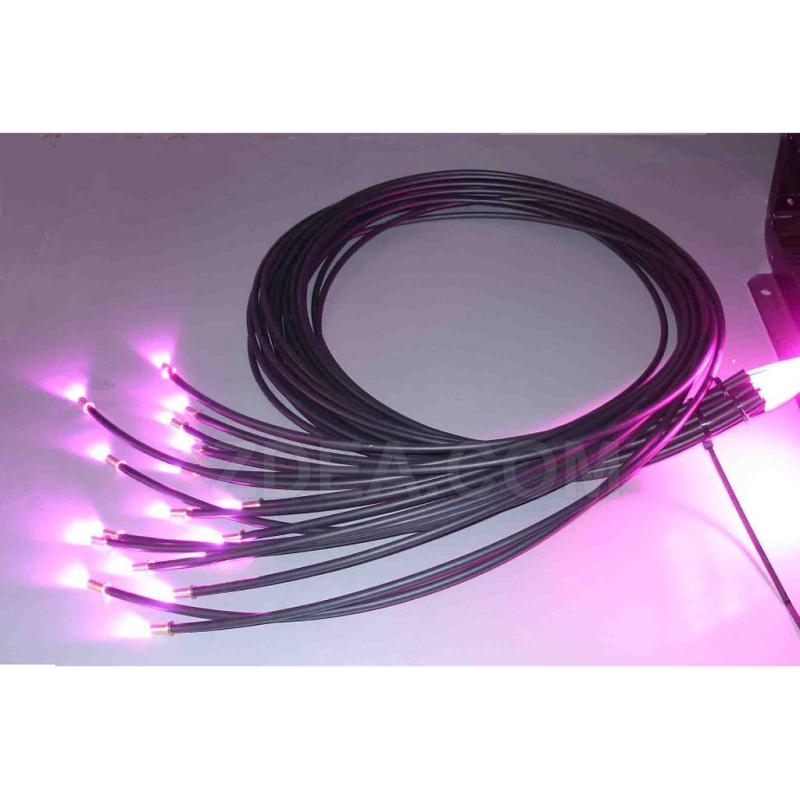PMMA Fiber Optic: Key Standards and Certifications

PMMA fiber optic technology
adheres to stringent standards and certifications that ensure quality,
reliability, and safety across various applications. Understanding these
standards is essential for stakeholders involved in the deployment and
integration of PMMA fiber optic lighting solutions.
Importance of Standards in PMMA Fiber Optic Technology
1. Quality Assurance: Standards establish criteria for the performance, durability, and
reliability of PMMA fiber optic products. Compliance with recognized standards
ensures that manufacturers meet industry benchmarks and deliver products that
consistently perform as expected.
2. Interoperability: Standardized PMMA fiber optic components facilitate
interoperability with other lighting and control systems. This compatibility
enables seamless integration into diverse applications, including architectural
lighting, commercial installations, and specialized lighting environments.
Key Standards and Certifications
1. ISO 9001: Quality
Management Systems: ISO 9001 certification
demonstrates that a manufacturer has implemented effective quality management
systems. It ensures that PMMA fiber optic products are manufactured under
controlled conditions with consistent quality and reliability.
2. UL Listing and
Certification: Underwriters Laboratories (UL)
certification validates the safety and performance of PMMA fiber optic
products. UL-listed components meet rigorous testing criteria for electrical
safety, fire resistance, and environmental impact, providing confidence to
consumers and industry professionals.
3. CE Marking
(Conformité Européenne): CE marking indicates
compliance with European Union directives and standards for electrical and
electronic equipment. PMMA fiber optic products bearing the CE mark meet
essential health, safety, and environmental protection requirements for sale
within the European Economic Area (EEA).
4. IEC Standards
(International Electrotechnical Commission):
IEC standards define technical specifications and testing methods for
electrical and electronic components, including PMMA fiber optic cables and
connectors. Compliance with IEC standards ensures product safety, performance,
and compatibility with global electrical systems.
Industry-Specific Certifications
1. RoHS Compliance
(Restriction of Hazardous Substances): RoHS
directives restrict the use of hazardous substances in electrical and
electronic equipment, including PMMA fiber optic components. RoHS compliance
certifies that products are free from substances such as lead, mercury, and
cadmium, promoting environmental sustainability.
2. Energy Star
Certification: Energy Star certification
identifies energy-efficient products that meet stringent energy efficiency
guidelines set by the U.S. Environmental Protection Agency (EPA). PMMA fiber
optic lighting systems with Energy Star certification help consumers and businesses
reduce energy consumption and lower operating costs.
Adherence to Environmental and Safety Regulations
PMMA fiber optic manufacturers and suppliers prioritize
compliance with regional and international regulations to ensure product safety
and environmental responsibility. By adhering to established standards and
certifications, stakeholders uphold industry best practices and contribute to
the sustainable growth of the fiber optic lighting market.
The adherence to key standards and certifications is integral to the success and widespread adoption of PMMA fiber optic technology in diverse applications. By meeting rigorous quality, safety, and environmental criteria, PMMA fiber optic products deliver superior performance, reliability, and interoperability essential for modern lighting solutions.
Refer to www.zdea.com
